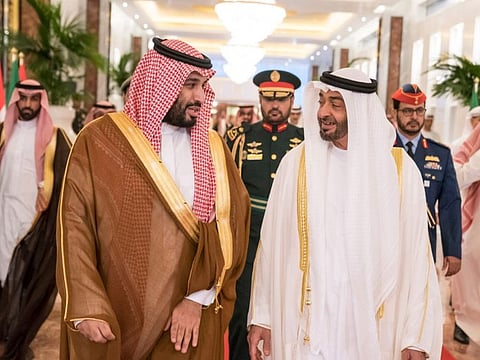Ties that bind: UAE, Kingdom share strategic purpose
Saudi Arabia, UAE have identical approaches to issues plaguing region

Dubai: Since the advent of the Arab uprisings in 2011, the fulcrum of power in the Middle East has shifted to the Gulf region. And this shift has been symbolised by the alliance between the UAE and Saudi Arabia. The two countries have never been closer. They are on the same page on all key issues plaguing the region. The UAE and the Kingdom have zeroed in on sources of destabilisation in the Middle East, closely aligning their position on, and response to, a wide array of security threats in the Middle East.
The UAE-Saudi alliance has evolved into a strategic partnership that underpins regional security. At the centre of this partnership is their shared world-view, and geopolitical perspective. Both countries are wary of any political instability in the region, leading as it often does to violence and extremism. They also take a dim view of the misuse of religion to achieve political goals. To this end, UAE and Saudi Arabia have taken the lead in targeting groups that espouse extremist ideologies, and have cracked down hard on the sources of their funding, earning international plaudits for doing so.
The regional cooperation between the two countries can also be seen in their identical approaches to issues such as the military intervention in Yemen to uphold the legitimacy of the internationally recognised government of President Abd Rabbo Mansour Hadi, their support for the government of President Abdul Fattah Al Sissi in Egypt, their pursuit of stability in Libya, their backing for the new political dispensation in Sudan, and the stance taken against Qatar for its support of extremist groups in the region.
But nowhere is the unity of purpose more clear than on the most serious security threat to the Middle East in general, and the Gulf region in particular: Iranian expansionism. Both Saudi Arabia and the UAE were quick to realise the dangers of Tehran’s relentless pursuit of regional hegemony, its interference in the internal affairs of Arab countries, its support for armed militia proxies, the threat it poses to international shipping and, above all, its nuclear programme. Both countries have taken the lead in checking this expansionism, and in trying to ensure that better sense prevails in the corridors of power in Tehran.
Meanwhile, on the bilateral front, relations continue to go from strength to strength, illustrated by the establishment of the Saudi-Emirati Co-ordination Council. The purpose of this body, which held its first meeting this month in Dubai, is the integration of services and financial markets, housing, tourism, aviation, customs and security. It also involves the creation of a Saudi-UAE cryptocurrency, and setting up of a joint platform to support small and medium businesses. Another initiative of this Council is to speed up the flow of traffic at key entry ports.
With Saudi Arabia’s Crown Prince Mohammad Bin Salman on his second official visit to the UAE this year, the leadership in both countries will be looking to further strengthen an alliance that has become an irreplaceable pillar of regional stability.



